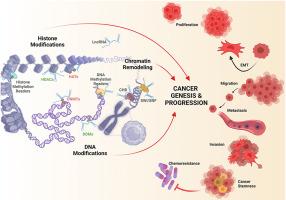LncRNAs and the cancer epigenome: Mechanisms and therapeutic potential
IF 9.1
1区 医学
Q1 ONCOLOGY
引用次数: 0
Abstract
Long non-coding RNAs (lncRNAs) have emerged as critical regulators of epigenome, modulating gene expression through DNA methylation, histone modification, and/or chromosome remodeling. Dysregulated lncRNAs act as oncogenes or tumor suppressors, driving tumor progression by shaping the cancer epigenome. By interacting with the writers, readers, and erasers of the epigenetic script, lncRNAs induce epigenetic modifications that bring about changes in cancer cell proliferation, apoptosis, epithelial-mesenchymal transition, migration, invasion, metastasis, cancer stemness and chemoresistance. This review analyzes and discusses the multifaceted role of lncRNAs in cancer pathobiology, from cancer genesis and progression through metastasis and therapy resistance. It also explores the therapeutic potential of targeting lncRNAs through innovative diagnostic, prognostic, and therapeutic strategies. Understanding the dynamic interplay between lncRNAs and epigenome is crucial for developing personalized therapeutic strategies, offering new avenues for precision cancer medicine.

LncRNAs 与癌症表观基因组:机制与治疗潜力》。
长非编码 RNA(lncRNA)已成为表观基因组的关键调控因子,通过 DNA 甲基化、组蛋白修饰和/或染色体重塑调节基因表达。失调的lncRNA可作为致癌基因或肿瘤抑制因子,通过塑造癌症表观基因组来推动肿瘤进展。通过与表观遗传学剧本的撰写者、阅读者和擦除者相互作用,lncRNA诱导表观遗传学修饰,从而导致癌细胞增殖、凋亡、上皮-间质转化、迁移、侵袭、转移、癌症干性和化疗耐药性的改变。这篇综述分析和讨论了 lncRNA 在癌症病理生物学中的多方面作用,包括癌症的发生、发展、转移和耐药性。它还探讨了通过创新诊断、预后和治疗策略靶向 lncRNAs 的治疗潜力。了解 lncRNA 与表观基因组之间的动态相互作用对于开发个性化治疗策略至关重要,为癌症精准医疗提供了新途径。
本文章由计算机程序翻译,如有差异,请以英文原文为准。
求助全文
约1分钟内获得全文
求助全文
来源期刊

Cancer letters
医学-肿瘤学
CiteScore
17.70
自引率
2.10%
发文量
427
审稿时长
15 days
期刊介绍:
Cancer Letters is a reputable international journal that serves as a platform for significant and original contributions in cancer research. The journal welcomes both full-length articles and Mini Reviews in the wide-ranging field of basic and translational oncology. Furthermore, it frequently presents Special Issues that shed light on current and topical areas in cancer research.
Cancer Letters is highly interested in various fundamental aspects that can cater to a diverse readership. These areas include the molecular genetics and cell biology of cancer, radiation biology, molecular pathology, hormones and cancer, viral oncology, metastasis, and chemoprevention. The journal actively focuses on experimental therapeutics, particularly the advancement of targeted therapies for personalized cancer medicine, such as metronomic chemotherapy.
By publishing groundbreaking research and promoting advancements in cancer treatments, Cancer Letters aims to actively contribute to the fight against cancer and the improvement of patient outcomes.
 求助内容:
求助内容: 应助结果提醒方式:
应助结果提醒方式:


